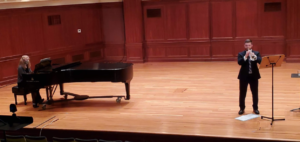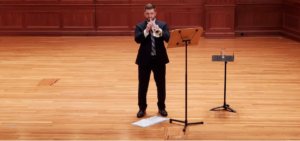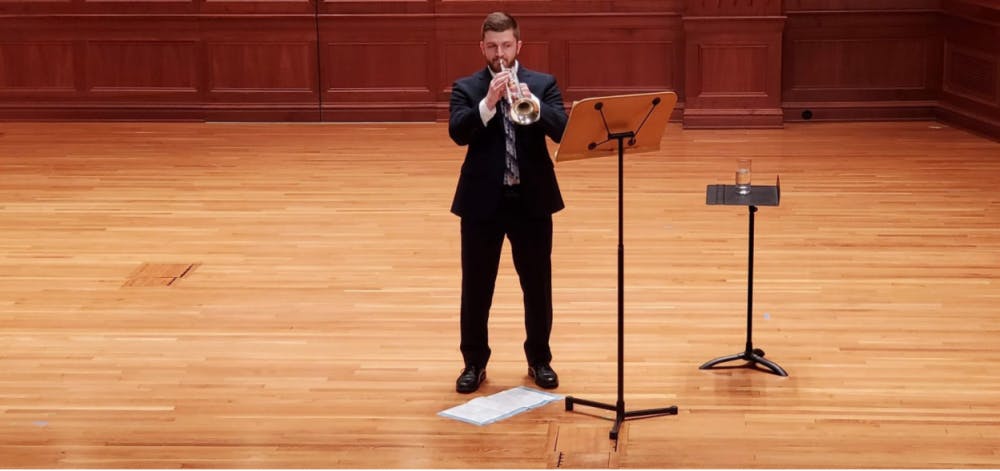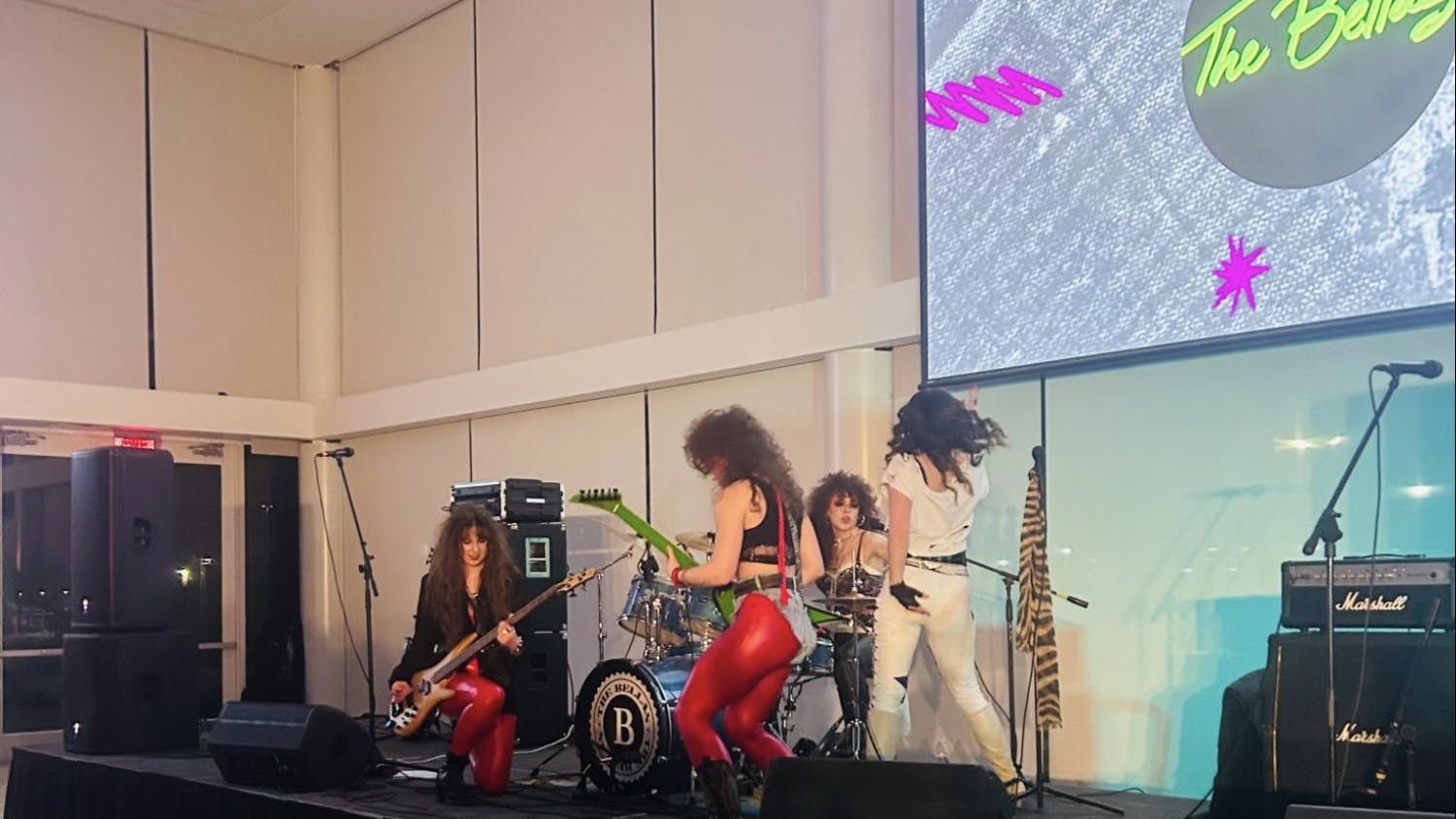By Julia Duggan
Senior Staff Writer
Normally, Sundays in April are very busy for those in the music building. Sunday afternoons and evenings used to have crowds of people entering Mayo Concert Hall to attend senior recitals. The visitor parking lots would be full, no matter the weather. The lobby would be tightly packed as people waited for the door to open to find the perfect seat. But since the pandemic, things look a little bit different.
“I just remember being in awe, because here I was a little small freshman seeing these seniors that had been studying with professionals for years just showcase and demonstrate their skill and their talents,” said Bryan Cook, a senior music education major.

The students in the Music Department agree that it takes a lot of preparation to prepare for a senior recital.
“I noticed that my peers were constantly learning new repertoire, sometimes playing two solo pieces in a semester,” senior Shrish Jawadiwar said. Jawadiwar is a music and political science double major. “When I asked them why this was, they said it would help prepare them for a piece further in their undergraduate career, and eventually for a senior recital piece. It seemed that all the preparation in solo repertoire was geared toward a stronger senior recital.”
Senior recitals are mandatory for most music majors that study at the College. To complete a senior recital, students must play 25-35 minutes of music (repertoire). This music is mostly solo repertoire, meaning that for most of the recital it is just the performer on stage. Or, if the music calls for it, there will be a performer and a piano accompanist. Depending on the major, the performer must have also completed a junior recital or a Tuesday afternoon recital their junior year. Since the pandemic closed all recital halls, this presented a challenge for the music department to continue having performances so students can graduate on time.
“Maybe two or three of the recitals really started before the pandemic started in early March, so I know a decent amount of (seniors) unfortunately just didn't get to perform,” said Cook. “I know the (music) department did work with them to kind of showcase a minute or two of music on digital social media and stuff like that, so that was good that they could still put their favorite part of the movement, but there was no digital live stream”
Cook explained that the music department, like the rest of the College, had to adapt to dealing with the pandemic, and it took some time to find the right technology.
“We had to adapt all (of) this,” Cook said. “All these things we're seeing with digital music took time to develop and (to) really feel comfortable with, so they kind of just got hit with the short end of the stick.”
Since the College is now allowed to be in the ‘Flex’ form, this allows for the Senior Recitals to feel closer to the real thing. Most Senior Recitals typically happen in the Spring, so there was more time to plan the format while maintaining the social distance requirements of the College. According to Cook, the original plan was to have the performer play in Mayo Concert Hall wearing a musician’s mask and no audience. A livestream would be provided for everyone to watch the performance.
“It was not all of the seniors, but a few weeks ago the majority of them wrote a letter to Dean Hall and President Foster just addressing some of the things that we thought could be taken into consideration moving forward,” Cook said.
Cook said that the seniors value the health and safety of everyone, but at the same time they wanted to get as close as they possibly could to what senior recitals looked like before the pandemic.

“We've seen the school with athletic events and other events have audience members in a safe and secure manner,” Cook said. “So, we were just wondering if there's a way that we could still do that, so by kind of stating some of those observations we've had and some of the things we've seen happening. We realize it's possible to spread out and have a mask on, complete the Wellness check on the Roar app, while still having a small audience and still have a great recital so we sent that letter just with some of those suggestions.”
The feedback the seniors received from the letter was positive, according to Cook. Now the performer is allowed to perform without wearing a musician’s mask due to the updated air circulation in Mayo Concert Hall and just the amount of space that would be between the performer and where all the seats are located. The reason why the senior protested wearing a musician’s mask is because of how restrictive it is to the sound of instruments.
The other major change is the seniors are now allowed to have a small audience at their Senior Recitals.
“We were able to get our parents to come in and 12 TCNJ students or faculty,” Cook said. “We have to send in a list to the Department of who's going to have a spot reserved and they have to do all the things I talked about in the Roar app, they're going to be wearing a mask, spread out in the Hall, so on and so forth but at the end of the day there's a small audience.”
For all those who are not on the small list to sit in the audience, the music department has set up a web page for people to access the live stream. This web page features the programs that all the seniors are required to make themselves, as well as the dates and times for all the performances. The first performance is this Saturday April 17, and Sunday April 18, featuring Miranda Inglese, a senior music education major, Emma Schell, a senior music education major, and James Mikula. Senior recitals will be occurring until May 2.
“I was lucky to have the opportunity to hear senior recitals in both in-person and virtual modes, as the recitals are now hybrid; I noticed that over Zoom, there were some latency issues, as well as issues hearing all performers, especially in quieter moments of music,” Jawadiwar said.
Despite all the added technology preparation, the seniors are still grateful to be performing.
“I know that people are going to be watching and sharing this journey with me, which is really great and again we completely understand the need for safety, and we're grateful for all involved that helped make these possible in the first place,” Cook said.







